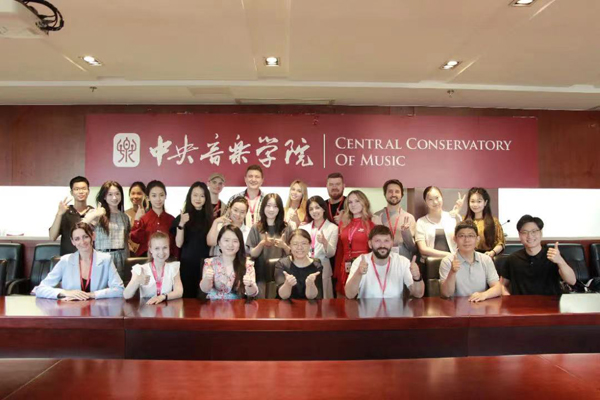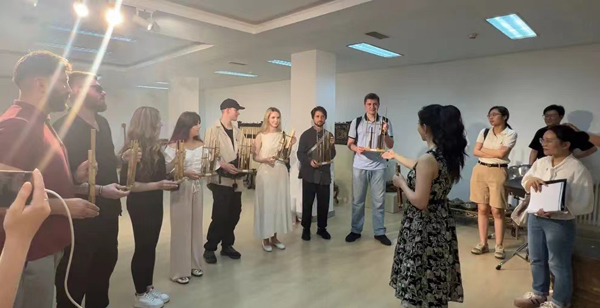Russian Youth Delegation Visits China for Cultural Exchange Program
A delegation of 10 Russian youth visited China from June 23 to 29 to participate in the Sino-Russian Youth Cultural and Creative Exchange Program, focusing on music-themed exchanges in Beijing and Suzhou.
During their stay in Beijing, the delegation visited institutions such as the Central Conservatory of Music (CCOM), the China Oriental Performing Arts Group and the cultural center of Haidian district, and met with officials from the China International Youth Exchange Center (CIYEC), the organization which had invited them to the country.
At CCOM, the delegation toured the opera and concert hall, listened to rehearsals by the conservatory's symphony orchestra and choir, and held discussions with faculty and students, who gave an introduction on the history and development of the school and its departments.
After learning about the development in China of music created with artificial intelligence (AI) and music information technology, Danil Tiurin, a musician and electronic engineer at Kerama Maraczi, said institutions like Yandex.Music, VK.Music, Sberbank and the Skolkovo Innovation Center in Russia are also actively developing music AI. Tiurin said he is confident that AI will bring more opportunities for the development of the musical cultures of both countries and added that he is hopeful there can be cooperation in this field.

The Russian delegation holds a symposium with faculty and students of the Central Conservatory of Music.
At the China Oriental Performing Arts Group, the delegation visited the qinglyu space, watched rehearsals by the folk orchestra, toured the instrument museum, and held discussions with young representatives of the group. Ilia Sharov, Composer and Artistic Director at the Komoni folk dance troupe, said young Chinese folk musicians had revitalized traditional Chinese music through various innovative forms. He said he hoped for future cooperation in hosting concerts themed on Sino-Russian folk music, as the Russian government is also strengthening the protection of and research into traditional music.

The Russian delegation visits the instrument museum of the China Oriental Performing Arts Group.
At the cultural center of Haidian district, the delegation held discussions with representatives from the Acappella league of Beijing, the city's youth choir and the youth symphony orchestra of Haidian. They also watched a performance by art groups from Beijing's Zhongguancun neighborhood. Veronika Seliukova, an expert from the Creative Center of the Russian State Ipolitov Ivanov Music Pedagogical Institute, and Ilya Sharov performed Russian songs on stage. Oksana Strelizova, Director of the non-profit International Center for the Support of Environmental, Sports and Cultural Projects, praised the plethora of diverse, grassroots cultural activities in China, noting that these activities not only enrich the spiritual life of the people but also showcase the vitality of Chinese culture.
During their stay in Suzhou, the delegation visited institutions such as the Kunshan Kunqu Opera Cultural Center, Kunshan Opera Museum, Taicang Cultural Center, Jiangnan Silk and Bamboo Museum, Suzhou University School of Music and the Suzhou National Orchestra, and participated in a Sino-Russian youth music-themed salon.
At Suzhou University, the delegation held discussions with professors and student representatives from the School of Music. Veronika Selyukova expressed her desire to cooperate with Chinese educational institutions to jointly promote the development of music culture in both countries.
At the Suzhou National Orchestra, the delegation participated in a Sino-Russian Youth Cultural and Creative Exchange Salon, where representatives from both countries shared their ideas related to their respective musical cultures and sang the song of Sino-Russian youth friendship. Kirill Kuznetsov, a public relations specialist at the Ulyanovsk Region Creative Industries Foundation and founder and organizer of the Barzha Live Music Festival, said he hoped to collaborate with Chinese partners to host a Sino-Russian Youth Music Festival, which would include musician exchanges, master classes, roundtable discussions and performances. Prior to the event, Chinese and Russian youth enjoyed a performance of famous Chinese and Russian pieces by the Suzhou National Orchestra.
While in Suzhou, the delegation also visited the Kunshan Kunqu Opera Cultural Center, the Taicang Beethoven Music-themed Immersive Salon, Jiangnan Silk and Bamboo Museum and Taicang Art Museum, soaking in the wealth of traditional Chinese art.
The CIYEC has collaborated with the Russian Federal Agency for Youth Affairs and the Russia-BRICS International Youth Cooperation Project Office to host the Sino-Russian Youth Cultural and Creative Exchange Program since 2023, which has been incorporated into the framework of the China-Russia Youth Business Incubator exchange project.
